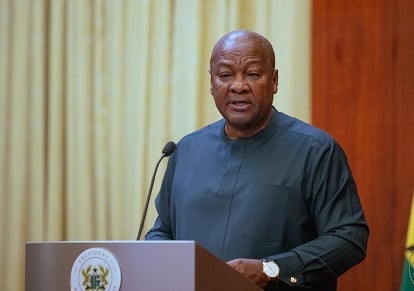The maritime industry in Ghana has long been plagued by contentious fees levied by foreign shipping lines, sparking concerns about their legality and potential exploitation of local businesses. President John Dramani Mahama, responding to these growing concerns, has ordered a thorough investigation into these charges, aiming to ensure transparency and fairness within the sector. This decisive action comes after persistent complaints from freight forwarders and other industry stakeholders, who argue that these unregulated “administrative fees” are arbitrarily imposed, driving up operational costs and hindering overall port efficiency. These added costs ultimately burden Ghanaian businesses, making them less competitive and potentially impacting consumers through higher prices. The President’s intervention signifies a commitment to addressing long-standing grievances within the maritime trade sector and promoting a more equitable business environment.
At the heart of the issue lies the legality of these charges. President Mahama, referencing existing Ghanaian law, emphasized that all fees and levies must be ratified by Parliament. This underscores the principle that any charges imposed within Ghana’s jurisdiction must be subject to legislative scrutiny and approval, ensuring accountability and preventing arbitrary financial burdens on businesses. The President’s assertion that these unratified charges are therefore illegal highlights the seriousness of the issue and the need for swift action. He has directed the Minister of Transport, Joseph Bukari Nikpe, and the Attorney General, Dominic Ayine, to jointly review all levies imposed by foreign shipping lines operating in Ghana. This review will determine the legitimacy of each charge and ensure that any valid fees are subsequently submitted for parliamentary approval, bringing them into compliance with existing law.
The President’s directive reflects a broader push for transparency and accountability within Ghana’s port operations. For years, industry experts and traders have called for government intervention to address these unapproved fees, recognizing them as a significant obstacle to trade facilitation and revenue generation. These arbitrary charges not only increase the cost of doing business but also create an uneven playing field, potentially disadvantaging local businesses and hindering economic growth. By scrutinizing these fees and enforcing legal compliance, the government aims to streamline port operations, promote fair competition, and create a more conducive environment for trade and investment. This intervention signals a clear message that unregulated practices will not be tolerated and that the government is committed to protecting the interests of the Ghanaian business community.
The implications of this investigation extend beyond the immediate concern of arbitrary fees. It represents a crucial step towards enhancing the overall efficiency and competitiveness of Ghana’s ports. By eliminating unnecessary costs and streamlining procedures, the government can improve the flow of goods and services, facilitating trade and boosting economic activity. Moreover, increased transparency in port operations can enhance Ghana’s reputation as a reliable and attractive trading partner, attracting further investment and contributing to long-term economic growth. The successful resolution of this issue could serve as a model for addressing similar challenges in other sectors, further strengthening Ghana’s business environment.
The task now falls to the Ministry of Transport and the Attorney General’s Department to implement the President’s directive effectively. Their mandate includes a comprehensive audit of all charges imposed by foreign shipping lines, ensuring that each fee is justified and aligned with existing regulations. The process will likely involve engaging with the shipping lines to understand their cost structures and justifications for the various charges levied. Where discrepancies are found, the government will need to enforce compliance with the law, potentially through negotiations, penalties, or legal action. The success of this initiative hinges on the thoroughness of the investigation, the firmness of the government’s stance on compliance, and the effectiveness of the measures taken to rectify any irregularities.
The outcome of this investigation will be closely watched by stakeholders across the maritime sector. The business community, in particular, will be looking for tangible results, including the removal of unjustified charges and a more transparent and predictable fee structure. This action has the potential to significantly improve the operating environment for businesses involved in international trade, reducing costs and enhancing competitiveness. It also represents a critical test of the government’s commitment to tackling entrenched challenges within the maritime sector and fostering a more equitable and efficient trading environment. The success of this initiative will send a strong signal about Ghana’s resolve to promote fair business practices and create a more conducive climate for economic growth and development.


